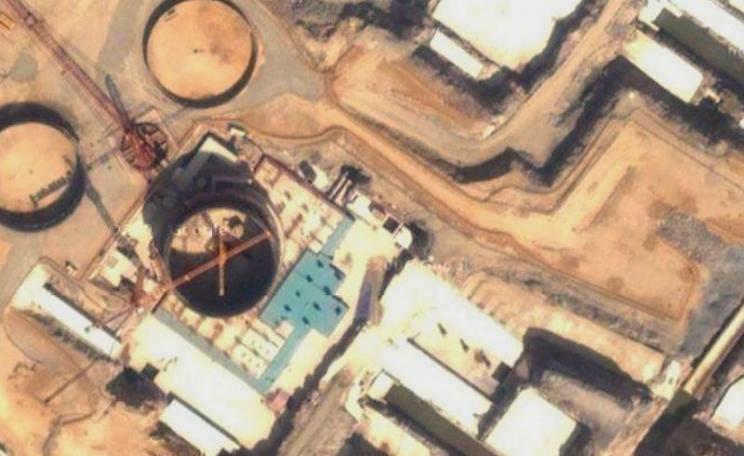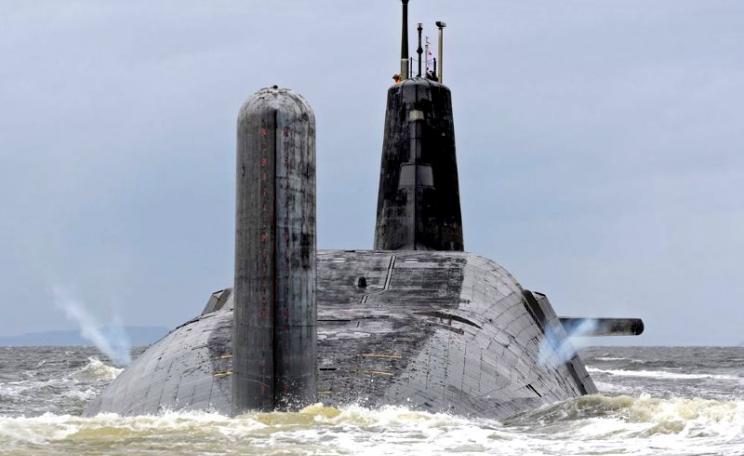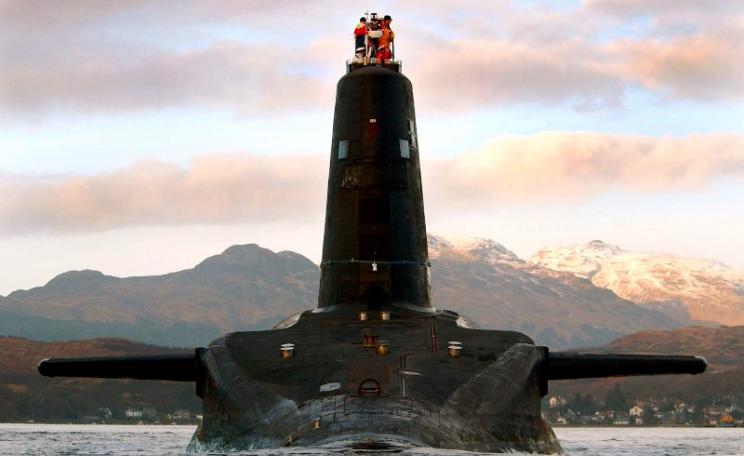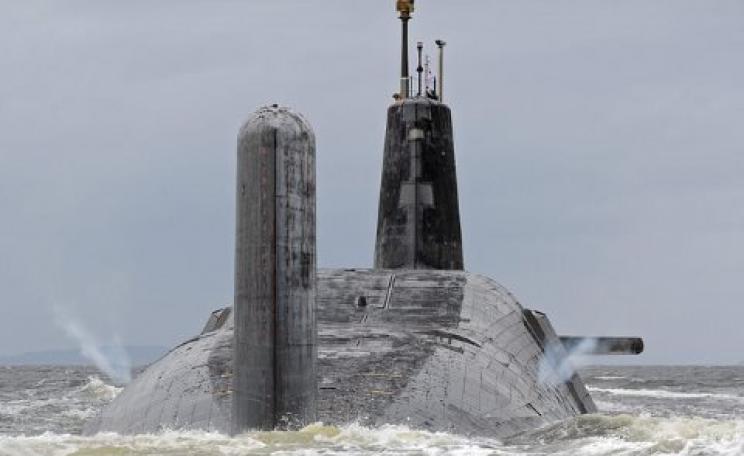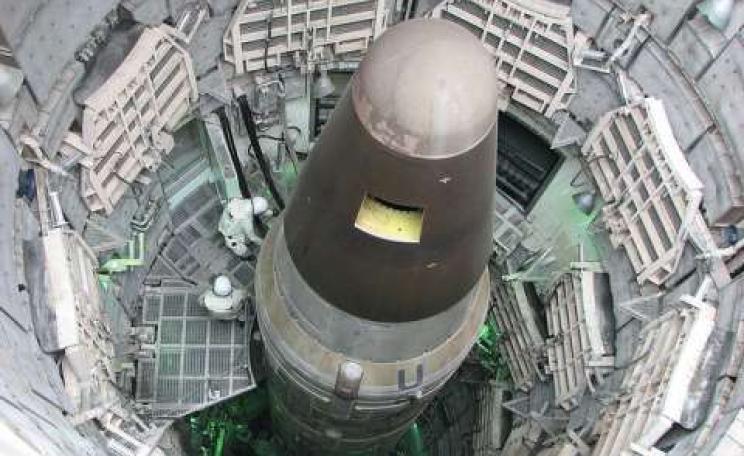Finally, the UK may rid itself of this cold war relic. HMS Victorious on the Clyde. Photo: Photo: Will Haigh for UK Ministry of Defence via Flickr (CC BY-SA 2.0).
Voters in Britain have a bigger chance than they have ever before to bring an end to Britain's addiction to nuclear weapons, and cause an important upset to the global nuclear order.
Trident has in the last few weeks become one of the most potent symbolic political markers for the forthcoming election, and is likely to feature heavily in the debates.
Some of us who have been closely involved in the issue for decades may have been taken by surprise ... previous promising moments have come and gone with minimal fuss and it has been a challenge not to become cynical.
But this time is different, and there are a number of factors at play, not least the rise of the smaller parties.
Whilst they lost the referendum back in September, the SNP were closer than most were expecting a year ago to successfully breaking up the union. Since then they have experienced a surge of support, are likely to increase their representation in Westminster in May and could well be a crucial dimension in any power arrangement after the election.
They have already highlighted the removal of Trident bases from Scotland as an absolute condition of any support they may give in negotiations. Statements have been uncompromising, so that it will be a big political challenge to row back from them should they come under pressure to change course.
A strong Green challenge could prove decisive
The Green Party, previously hoping to secure 2-3 seats on a very good day, could become serious challengers for more. Perhaps equally importantly, Green candidates up and down the country could capture many left-wing votes from disillusioned left wing voters who see the cautious positioning of Labour with dismay.
Some have even been suggesting that the Greens could do more damage to Labour prospects than the threat UKIP has to the Tories, in a sort of Ralph Nader moment.
They already have more members than UKIP and the LibDems, and could break through 50,000 in the coming few weeks. Of course, it is moments like these, with the Greens punishing the larger parties for their reckless support of unsustainable neo-liberal capitalist solutions, that their influence is strongest.
So far, particularly on the Trident issue, Labour has been captured by the narrative around legacies of lost elections in the dim and distant past. But their paranoia about being seen as a left wing could yet cost them more votes than it secures. It is about time they realized that the public is in a very different place.
When in the 1980s, heavily influenced by the fear-induced Cold War, a strong unilateralist stance may well have lost crucial support in various parts of the country, it is today generally ambivalent towards investment on Trident.
A time of austerity and cuts just when a new generation of submarines demands major investment could yet prove fatal to the project.
Is this a clever way for the UK to spend £4 billion a year?
Much has been made by campaign groups of the £100bn lifetime cost of the system, which is a reasonable estimate given the uncertainties involved in financial forecasting over such a long period.
Voters in Britain have a bigger chance than they have ever before to bring an end to Britain's addiction to nuclear weapons, and cause an important upset to the global nuclear order.
Perhaps more meaningful, though, is the annual spend ... and this will soon be shooting up from around £2.5bn today towards £4bn a year throughout the 2020s, with capital costs consuming a full one third of the whole defence procurement budget across the decade.
In Tuesday's Commons debate former Lib Dem defence minister Nick Harvey used parliamentary privilege to expose the fact that the army is being asked to come up with plans to make do with manpower levels around 60,000 - a massive cut and one likely to reverberate around the Shires.
This creates unusual allies between anti-nuclear activists and armed forces constituencies.
Cheaper dual-capable nuclear options to Trident that could also plug the armed forces financial gap are now being considered seriously, promising to split the pro-deterrence lobby, enabling some to join the clamour for a reassessment and a less distorted government review later in 2015.
Cold war warmed up?
But remember: Trident is a weapon system dreamt up and developed in a Cold War context. Skirmishes and threats at the margins of Europe aside, no-one seriously considers the prospects of Britain facing an aggressive and totalitarian nuclear superpower alone as significant.
And yet that is the only scenario that could just justify the independent nuclear deterrent that both the Tory-led government and Labour Party are currently committed to hollowing out the armed forces for.
At a time when the future of the Nuclear Non-Proliferation Treaty (NPT) hangs in the balance and states parties meet in New York for their every-five year review (at the same time as the election), Britain's leadership is critical. And yet we are nowhere, our credibility severely dented by this insistence on wasting billions on our own arsenal.
Nuclear weapon states meet in London in early February to consider their game plan at the conference. The hopes of them pulling any scrawny rabbits out the hat at this final hour seem dim indeed.
Your vote can help rid us of this terrorist monstrosity
Returning to the election, the best we can realistically hope for from Labour is that it retain its commitment to a minimum credible nuclear deterrent - with some ambiguity around the posture and systems this entails, on the basis that Trident must be included in the Defence and Security Review soon after the election.
This will enable smaller parties, notably the SNP and the Greens, to take on a critical role in post election talks and demand a change in policy on Trident.
But what they do before the election matters too: the more they raise Trident in the campaign, the more they reflect public opposition to the spend, and the more influential they are in the result, the stronger their elbow at this crucial point becomes.
Perhaps then we will see a new government pause, order another delay and review, and perhaps we may yet see them move back from committing to a new generation of nuclear weapons before it's too late and the money is committed.
Voters in Britain have a bigger chance than they have ever before to bring an end to Britain's addiction to nuclear weapons, and cause an important upset to the global nuclear order.
Demo: Wrap up Trident - today, midday at the MOD in London.
Paul Ingram has been the Executive Director for the British American Security Information Council (BASIC) since 2007. BASIC works in the US, UK, Europe and the Middle East to promote global nuclear disarmament and a transformation in strategic relationships using a dialogue approach.
He was also until recently a talk show host on state Iranian TV promoting alternative perspectives on strategic matters, and taught British senior civil servants leadership skills.
Previously Paul was a Green Party councillor in Oxford and co-Leader of Oxford City Council (2000-2002) and a member of the Stop the War Coalition Steering Group (2002-2006).



